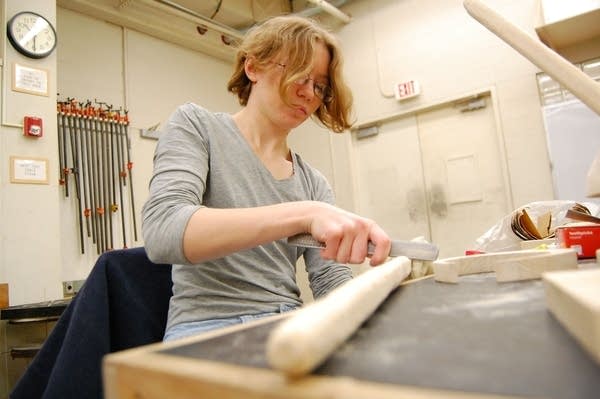Looking to boost numbers, MCAD tries tuition freeze

Students at the Minneapolis College of Art and Design are getting some relief from the rising cost of tuition.
The four-year private college is going to freeze tuition for one year, a move college officials say is an acknowledgement that increasing tuition has become a burden for students, especially in this poor economy.
But it's also part of a broader effort to turn around falling enrollment at the college, something other arts colleges across the country are doing as well.
For students at MCAD, the yearly cost of tuition is $29,700. That's about the average sticker price for a private four-year college in Minnesota. What students actually pay usually ends up to be less, after scholarships and grants.
Create a More Connected Minnesota
MPR News is your trusted resource for the news you need. With your support, MPR News brings accessible, courageous journalism and authentic conversation to everyone - free of paywalls and barriers. Your gift makes a difference.
But it's still a lot of money. By comparison, undergraduate tuition at Minnesota's state-run universities is about $6,000 and the University of Minnesota runs around $11,000 a year.
Tuition at MCAD has generally gone up about $1,000 a year in recent years, but this fall, college officials say they want to give students a break from keeping up with rising tuition costs--at least for one year.

President Jay Coogan says increasing tuition has forced some students to drop out.
"And we're hoping through holding tuition level that we get some of those student to come back and return finish their education at MCAD," Coogan said.
In the fall of 2007, more than 800 students were enrolled, but by fall of last year that number had fallen to 725. Officials at the school blame the poor economy.
So will a freeze in tuition bring students back to MCAD, or maybe even attract more students?
Bill Barrett, the executive director of the Association of Independent Colleges of Art and Design, said a one-year tuition freeze probably won't mean the return of a large amount of former students.
"I think you might get a few more students, a few percent more," he said.
And that might be all that it takes to stabilize enrollment at a small arts school like MCAD. Barrett hasn't heard if other colleges of arts and design (there's about three dozen in the country) plan similar moves.

At the Milwaukee Institute of Art & Design, this year's tuition was frozen at last year's level, about $24,000. That school's president, Neil Hoffman, says it was one part of a plan to strengthen enrollment.
"I held tuition down for very strategic reasons, no doubt [MCAD is] doing the same thing," Hoffman said. "But the tuition, by itself, is not the answer to enrollments. It's just a piece of it."
Hoffman says the other pieces included better fundraising, betting marketing of the college itself, and more academic and financial support for students so they're less likely to drop out.
Hoffman says arts school constantly battle the perception that their graduates are "starving artists". He says that's not the case, and that technology has created more jobs for students with arts degrees.
Enrollment at the Milwaukee Institute of Art and Design was 560 students three years ago, but Hoffman projects enrollment will as high as 1,000 students within a few years.
Meanwhile, MCAD's Jay Coogan says any improvement in enrollment at his school will likely be tied to the economy.
"If the economy improves then I think we'll see growth going forward," he said. "With the addition of some additional programs in succeeding years we'll also see additional growth in enrollment as well."
MCAD officials say the tuition freeze is a part of a strategic change that's just underway at the college. They're working to make better connections with companies to increase students' chances of getting a job after graduation.
The college also plans to raise more money and better market itself to potential students around the country.
